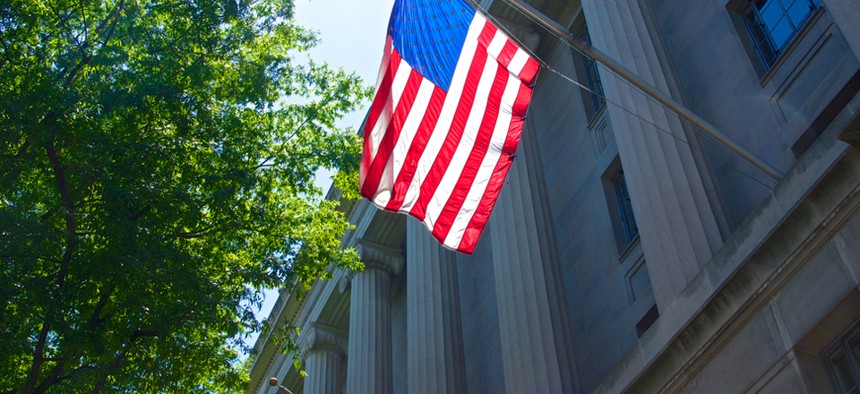
A flag hands on the Department of Justice headquarters in Washington. kenkistler/Shutterstock.com
Justice Reform in the U.S. Should Start With Probation
As the Justice Department probes the police crisis in Ferguson, leaders must also look at racial biases in the probation system.
The day after Missouri Governor Jay Nixon switched up the police presence in Ferguson, the scene looks much transformed. Ron Johnson, above, captain with the Missouri Highway Patrol, led protesters in a peaceful march last night—the same protesters on whom St. Louis County Police Department officers trained rifles the day before.
But in other ways, it's the same-old same-old. At a press conference today, police handed out information linking Michael Brown—the unarmed 18-year-old shot dead by six-year Ferguson police veteran Darren Wilson—to a shoplifting incident. Information handed out at the press conference focused exclusively on the alleged robbery, skipping over the circumstances that led to Brown's shooting, reports The Washington Post 's Wesley Lowery.
Today, the U.S. Department of Justice is making its presence felt in Ferguson. "At a time when we must seek to rebuild trust between law enforcement and the local community, I am deeply concerned that the deployment of military equipment and vehicles sends a conflicting message," said Attorney General Eric Holder in a statement . "At my direction, Department officials have conveyed these concerns to local authorities."
Holder said that more diversity in law enforcement could help improve relations between the police and community. Beyond Ferguson, that recommendation could help to address one of the aspects of the justice system that has the broadest impact on African Americans: probation.

(Urban Institute)
Like many points along the justice system, probation is weighted against African Americans. Black probationers are more likely to see their probation status revoked than white or Hispanic probationers. Probation practice affects a dramatically large percentage of the population: Probationers outnumber parolees, jail inmates, and prisoners combined.
These are the findings from a recent report released by the Urban Institute on racial bias and probation practice. Researchers surveyed four probation departments (in Dallas County, New York City, Iowa's Sixth Judicial District, and Oregon's Multnomah County) using data on probationer demographics, criminal history, and other factors to look at hearings in which courts or judges revoked someone's probation status.
"In every study site, black probationers had substantially and statistically significant higher odds of revocation than white or Hispanic probationers," the report reads. In Dallas County, revocations rates for black probationers were 55 percent higher than revocation rates for white probationers. Controlling for various factors, across the board, white probationers were 18 to 39 percent less likely to see their probation revoked.

(Urban Institute)
Understanding racial bias as it affects decisions about probation means looking at group differences. Part of the disparity in probation revocations can be narrowed by factoring for different variables between black, white, and Hispanic probationers—prior convictions, criminal history, employment status, and age and gender among them. Even factoring for group differences, a statistically significant chunk of the disparity in findings can't be explained this way.
"The portion of the disparity that could not be explained by group differences may be due to unequal treatment based on race," the report finds. Limitations to the different kinds of data prevents the researchers from drilling down to bedrock proof. But the small disparity between white and Hispanic revocation rates can be explained by group differences. The large disparity between white and black revocation rates cannot—suggesting, if not revealing, some level of bias.
Survey respondents from all four probation departments said that minorities were "more likely to be arrested by law enforcement in general and that minority communities tended to be more saturated with police, making contact with the police more frequent." That means more arrests, more violations, and more incarcerations for black Americans, something Emily Bazelon discussed at Slate in a story about why she's reluctant to call the police in situations involving black people. The police, of course, are already rooted in those communities. But, as the nation witnessed this week, police are not always from those communities.
The nation craves answers to the most egregious instances of injustice: answers for Michael Brown, Eric Garner, Ezell Ford—the list goes on. But the nation also needs a better understanding for how probation hearings work for black communities, given that probation accounts for such a large number of point interactions in the American justice system.
( Image via kenkistler / Shutterstock.com )






